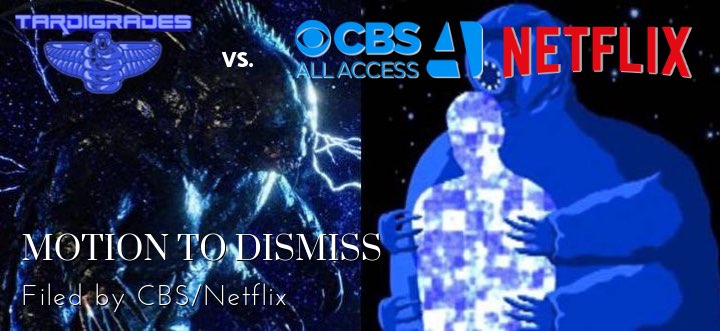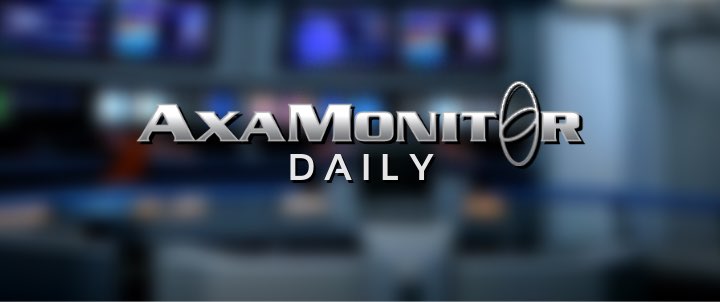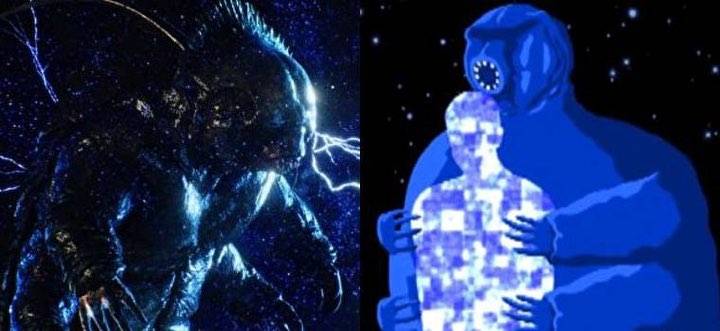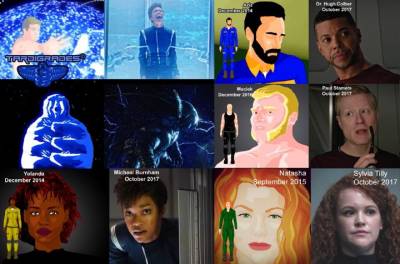This is an old revision of the document!
 CBS lawyers say that apart from both being tardigrades, these two characters are nothing alike. Illustration/AxaMonitor
CBS lawyers say that apart from both being tardigrades, these two characters are nothing alike. Illustration/AxaMonitor
FEBRUARY 13, 2019 | 8 MINS READING TIME
CBS: Tardigrades Creator ‘Manufactured Similarities’
Motion to dismiss Star Trek: Discovery-Tardigrades Copyright Lawsuit Filed in Federal Court
Table of Contents
CBS and Netflix’s lawyers made a remarkable claim in their February 12, 2019, motion to dismiss the copyright suit against Star Trek: Discovery by Anas Abdin, developer of the Tardigrades videogame: That Abdin tried to “manufacture the appearance of similarity” between his work and Discovery:
These “similarities” are utterly trivial when comparing the absence of any coherent plotline in Plaintiff’s work to the richly developed and varied stories running through the approximately 11 hours of Defendants’ allegedly infringing series.1)
No Challenge (For Now) to Access Claim
 SIGN UP You can subscribe to AxaMonitor Daily to be the first to read news stories like this from AxaMonitor.
SIGN UP You can subscribe to AxaMonitor Daily to be the first to read news stories like this from AxaMonitor.
The motion doesn’t challenge Abdin’s allegation CBS employees accessed and copies his work, but only for the purpose of seeking dismissal since that assumption isn’t integral to the argument the two works aren’t substantially similar.
Proving access to and copying of Abdin’s published work is important, though, but being dealt with separately by the judge.
No Substantial Similarity
MOTION TO DISMISS You can read the 31-page motion. Download (7.4 MB PDF).
Under U.S. copyright laws, the concept of substantial similarity is a key part of determining whether copyright infringement has occurred. There are other components, but this is the one upon which CBS’ case largely hinges.
CBS’ lawyers argue an actual comparison between Discovery and Anas Abdin’s never-published Tardigrades videogame reveals no substantial similarities between the two.
Watch
THIS ‘TARDIGRADE HUG’ sequence appears only in this 14-second video posted to YouTube on July12, 2017, just two months before Star Trek: Discovery aired.
The motion noted that the actual registered copyrighted work is not the unfinished game, nor Abdin’s 23 short concept YouTube videos, nor his blog posts, but instead a “treatment” consisting of text and static artwork. Abdin claims the Tardigrades videos and other blog posts were also infringed. In the motion, CBS disagreed:
- The Tardigrade hug sequence pointed to as proof of infringement is a 13-second video posted on YouTube in July 2017, two months before Discovery’s premiere but long after the show had been developed and filmed.
- “The only ‘similarities’ between the game and Discovery, says CBS, “is that both tardigrades are enlarged and can move through space. Space-faring tardigrades — including enlarged fictional tardigrades — are, of course, not original to Plaintiff.”
- Other purported similarities are too generically described to qualify for copyright protection, according to the motion.
What is Substantial Similarity?
According to the American Bar Association, in copyright infringement cases courts traditionally test for substantial similarity using “a subjective, factual analysis called the ‘audience test,’” whose goal is to see if ordinary observers, unless they set out to detect the differences between the works, “would regard their aesthetic appeal as the same.”2)
Moreover, the audience test “asks whether the defendant wrongly copied enough of the plaintiff’s protected expression to cause a reasonable lay observer to immediately detect the similarities between the plaintiff’s expression and the defendant’s work, without any aid or suggestion from others.”3)
Other Alleged Similarities
The motion also focused on a number of “other purported ‘similarities’ alleged to exist between [Abdin’s] works and random elements plucked from … Discovery’s first season.”4) They included:
Uniforms
In his complaint, the defense said Abdin claimed his characters’ uniforms and those in Discovery were substantially similar because of their colors (e.g., white for medical officers) and that both works’ space suits “egg-shaped” helmets.
CBS said Star Trek has a long history of such uniforms, “that delineate status, rank, etc., and, if that were infringement, it is Plaintiff who is the infringer.”5).
Stock Characters
Abdin’s legal complaint pointed to similar characters in the two works, including:
- A blond white male biologist, though the two work in different fields. (Stamets on Discovery)
- A “darker complexion homosexual male with black hair” and facial hair, though the two were of different ethnic backgrounds. (Dr. Culber on Discovery)
- An “African-American female.” (Burnham on Discovery)
- A redheaded woman. (Tilly on Discovery)
Homosexual Relationship
Homosexual Relationship: Abdin’s legal complaint claims the romantic relationship between two characters in Discovery infringes on the male relationship portrayed in Tardigrades.
Floating Dots
The legal complaint includes a sequence from Discovery with Stamets inside his ship’s mycelial spore chamber surrounded by floating mycelial spores.
Tardigrades’ Carter character is depicted as merely floating in a dotted blue orb, providing “no explanation as to what this blue orb represents, and Plaintiff makes no claim that it is comprised of mycelial spores.”6)
The motion states Abdin’s supposed similarity “amounts to nothing more than the common portrayal of a man surrounded by blue and white dots (one sitting in a chamber, the other floating in space),” a trope often seen in science fiction. Included in the motion was an image from the Syfy series, The Expanse, which also portrays a man in space surrounded by blue and white dots.
Ship-Based Emitter
Plaintiff claims that Discovery wrongfully uses the word “emitter” to describe a ship-based emitter, because his work also contains a ship-based emitter that is also called an “emitter.”
Ethereal Travel
Abdin’s complaint claims Discovery took Tardigrades’ game concept because people are showing traveling “ethereally” in space.
In Discovery, Burnham uses headgear to create a mind meld to contact a Vulcan 1,000 light years away in mind only. , through a special form of Vulcan mind-meld, CBS’ attorneys wrote, while in Tardigrades “a shimmering character (apparently Carter) is simply walking on hexagonal stepping stones situated without explanation in a space-based ‘astro-plain.’”7)
Manufactured Similarity
The “ethereal headgear” claim is one instance of Abdin’s “manufactured similarity,” the motion states:
To manufacture the appearance of similarity, Plaintiff further claims that his character enters this “astro-plain” by donning head gear like Burnham. But a review of Plaintiff’s own materials shows that Plaintiff has combined two unrelated video GIF files that appear separately in his blog posts — one showing his character donning headgear, and a separate video depicting the “astro-plain” walk. In other words, the video showing his character donning headgear is not, in fact, associated with the “astro-plain” walk.
Manufactured Character Similarities
The motion to dismiss also took Abdin to task for trying “to mix and match character attributes to manufacture similarities.”8) Among the examples cited:
- Discovery‘s gay astromycologist Lieutenant Stamets is “similar” to Abdin’s Carter character (who is not gay) because both are biologists.
- Stamets is reportedly also similar to Abdin’s Ty character because both are gay.
- Stamets is also claimed to be similar to Tardigrades’ Maciek character, who is not described as gay in Abdin’s 2018 treatment, “but has morphed into being homosexual in the [legal complaint’s] collection of random similarities, apparently because he is closer in appearance to [Discovery‘s] Stamets.”
The motion goes so far as to claim Abdin “appears to falsely characterize a picture of Macieck violently confronting Aziz as reflecting intimacy between them. In any case, such composites do nothing to support Plaintiffs claim of character similarity.”9)
No More Similarities
The motion alleges Together, these are all of the purported “similarities” Plaintiff is able to identify between the voluminous set of materials comprising his Video Compilation (and 2018 Treatment) and the approximately 11 hours of Discovery’s first season.
Remove Netflix from Case
Netflix should be removed as a defendant because its streaming Discovery internationally falls outside the jurisdiction of U.S. copyright law, the motion argued. Its only domestic act was signing a license agreement, which by itself is perfectly legal.
Why This Case Matters
Abdin has become a cause célèbre among YouTubers and bloggers who intensely dislike Discovery, and who resent CBS for suing Alec Peters over his own infringing “professional, independent Star Trek film,” Axanar.
Fewer Remedies
The motion to dismiss also noted the number of remedies available to Abdin, even if his case moves forward, have already been significantly limited by concessions he made in the third amended legal complaint.
Here’s the status of what Abdin’s earlier legal complaint sought:
✅ Permanent injunction against producing Discovery. Still at issue
✅ Actual damages resulting from the alleged infringement. Still at issue
❌ Statutory damages allowed under copyright law. Conceded by plaintiff as ineligible
📛 Attorneys’ fees and costs. Challenged by defense as ineligible
What Happens Next?
Judge Lorna G. Schofield allowed Abdin's lawyers to try to link CBS employees to the Tardigrades game. A status letter also filed by both sides’ lawyers gave notice that subpoenas are expected to be served on both CBS and Valve, the owner of the Steam Greenlight platform which featured the game.
Overly Broad Subpoenas
CBS said it planned to contest the subpoenas as overly broad, a common defense tactic in these situations.
Also, document demands and written questions were submitted to the defendants on January 25 by Abdin’s attorneys. CBS argued these, too, are overly broad.
Plaintiff's Response
A response by Abdin’s lawyers to the dismissal motion is due March 5. 
COMMENTS
Discuss this article in AxaMonitor's Facebook group.
Keywords




